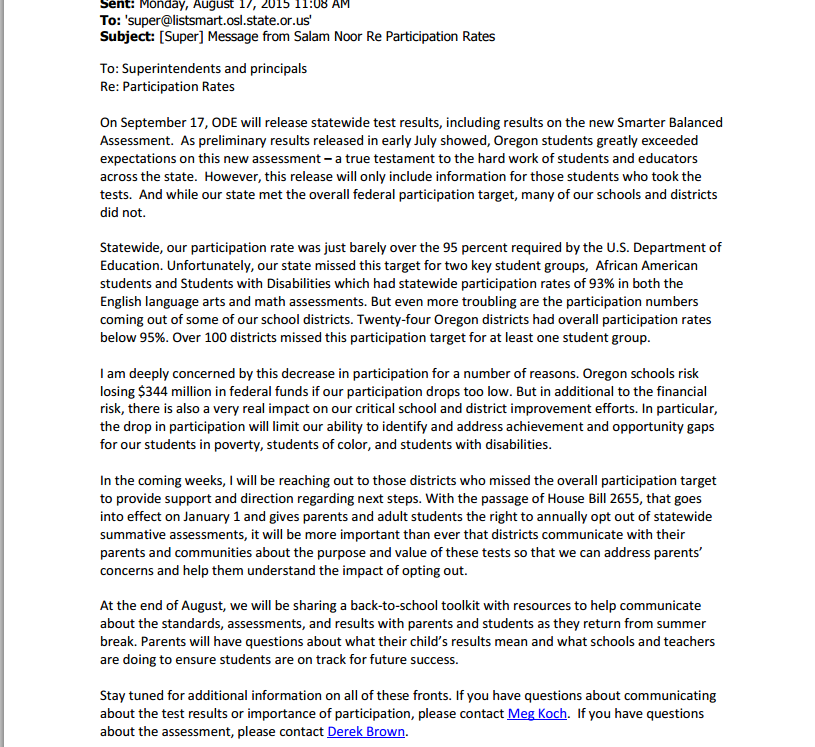Low-income students awaiting Kate Brown's leadership: Editorial Agenda 2015
The gnashing of many teeth accompanied last week's announcement that about $400 million in "kicker" revenue will be returned to taxpayers next year. The frustration responsible for so much dental damage is perfectly justified, as the public would be better served by locking the money away in a fund to be tapped for essential services – primarily public schools – in the event of an economic downturn. Still, while we're all for a good kicker kicking, the frenzy highlighted how little energy has been devoted in Salem to protecting a sum nearly as large.
That sum, $344 million, figures prominently in an Aug. 17 email by Oregon schools chiefSalam Noor, who warns about the consequences of low participation in standardized tests given to students across the state. Sent to superintendents and principals, the email notes that statewide participation on Smarter Balanced exams last year barely cleared the 95-percent threshold required by the U.S. Department of Education. Meanwhile, overall participation in nearly two dozen districts fell below the threshold, leaving Noor "deeply concerned ... for a number of reasons." Among these: "Oregon schools risk losing $344 million in federal funds if our participation drops too low."
Because testing also generates valuable data about what students know, Noor writes, a continued "drop in participation will limit our ability to identify and address achievement and opportunity gaps for our students in poverty, students of color, and students with disabilities."
Given the dollars and data at risk, and the disproportionate benefit of both to disadvantaged students, you'd think participation in Smarter Balanced exams would be universally accepted, if not necessarily loved. It is not, and heading Oregon's anti-Smarter Balanced crusade is the state's largest teachers union, the Oregon Education Association, which has cheered on the "opt-out" movement – Portland Association of Teachers president Gwen Sullivan memorably likened testing to child abuse - and even pushed for legislation that will make opting out easier to do. Standardized test results, you see, soon will become one component of teacher evaluations.
A recent edition of the union publication "Today's OEA" speaks glowingly of opt-out efforts in "regional pockets across Oregon." These include three districts on the list of 21 Smarter Balanced participation laggards released by the state Department of Education last week in response to a request by the Oregonian/OregonLive editorial board. Those three are Eugene, Portland and wealthy Lake Oswego, where about half of the test-eligible juniors at Lake Oswego High School refused to take the test, torpedoing the district's overall rate. Opting out of Smarter Balanced tests last year may have struck those Lake Oswego High juniors as a principled gesture, but the spread of such principles throughout the state will have consequences. One of these is the potential diminution of federal funding, including Title I funds – 40 percent of the sum Noor mentioned - which flow to the state's poorest schools. Lake Oswego High School is not one of these, but two of the district's schools – Oak Creek Elementary and River Grove Elementary – are, according to district Superintendent Heather Beck.
Noor is right to worry about plummeting participation. The Legislature this year approved a union-backed bill that will make opting out of the Smarter Balanced tests even easier. Districts now will all but invite students to do so. Noor gamely urges districts to fight this rigged battle by communicating with "parents and communities about the purpose and value of these tests ... (to) help them understand the impact of opting out." Thus have lawmakers, prodded by the teachers' union, reduced districts to pleading with families to take exams that are critical to the state's academic mission.
Surely, we can do better than this. Doing better, however, will require leadership from Gov. Kate Brown, whose words on standardized testing have been remarkably at odds with her actions. In June, Brown preached about "the need for accurate data across all student subgroups to evaluate student outcomes and make improvements at the student and system levels." Participation in testing, she argued, "is crucial for success" while diminishing student participation will increase the "risk (of) losing federal dollars, especially for students who have been traditionally underserved." These words, ironically, come from a statement that accompanied Brown's signing of the union-backed opt-out legislation.
Further muddying the question of Brown's loyalty is her selection of Lindsey Capps, a former teachers' union official, to serve as her education adviser. Next month, Capps will become the interim successor of retiring Chief Education Officer Nancy Golden.
The message that Smarter Balanced participation is crucial must come from Oregon's governor, forcefully and frequently. Words, however, aren't enough. There's no better way for Brown to send the necessary message – and demonstrate herself worthy of the office she's inherited – than by pushing the Legislature – hard – to repeal the opt-out bill that undermines the very values she professes.Low-income students awaiting Kate Brown's leadership: Editorial Agenda 2015 | OregonLive.com:


